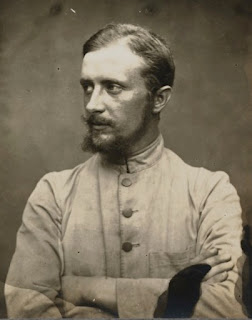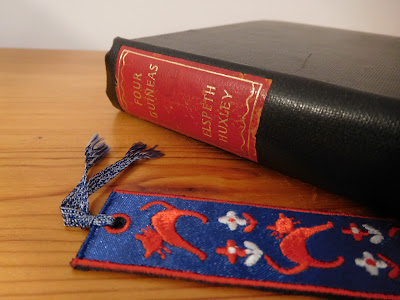THE COMPENSATIONS OF PLUNDER by Justin M. Jacobs (University of Chicago Press, 2020)
An excellent and informed riposte to the increasingly prevalent notion that all art objects and ancient artefacts acquired in colonial and semi-colonial contexts are imperialist 'loot' - i.e. stolen - due to the relative imbalance in social/financial standing of the respective parties involved (individuals and nations). The Compensations of Plunder takes a leavening view of the current trends informing both popular and academic historiographical outlooks and warns against projecting our own perceptions and values onto historical actors whose worldviews were differently informed and therefore wholly distinct when compared to our own.
 |
| Aurel Stein |
 |
| Sven Hedin |
 |
| Paul Pelliot |
Using the most prominent Western
archaeologists of 'the Silk Road' (Aurel Stein, Sven Hedin, Paul Pelliot, Roy
Chapman Andrews, Langdon Warner) during the first half of the twentieth century
as his main examples, Justin Jacobs explores the difference in outlook between local
officials at the time (rooted in traditional Confucian scholarly ideals) and
their later (more nationalist-minded) successors who vilified the likes of
archaeologists such as Sir Marc Aurel Stein. In doing so, Jacobs demonstrates
how the concept of value in relation to archaeological artefacts and
ancient manuscripts altered over time as a direct result of such outsiders’
interests in acquiring, preserving and studying such material. Originally the
permissions extended to, and the subsequent transactions with these outsiders
were fully understood and sanctioned by local elites and other indigenous
agents, who perceived they were receiving a worthwhile return in the form of
cultural, social, political, diplomatic as well as *financial* capital
from such interactions and exchanges (hence the ironic title: 'compensations of
plunder'). Indeed, without their active cooperation these Western
archaeologists could not have travelled so widely, or excavated so extensively,
nor removed such large quantities of material from the region. Ironically
again, it was the moulding of the perception of later Chinese elites, a new
younger generation of scholars and officials, who were often trained in the
West, whose perceptions changed and so turned against foreign academics and
'imperialist adventurers' who had previously operated in China and eventually
succeeded in drastically curtailing their activities when they agreed to
undertake such expeditions jointly with Chinese academics, or otherwise managed
to shut them down entirely and ultimately kick them out altogether, even before
the advent of the CCP in 1949.
 |
| Langdon Warner |
But that's not to say Jacobs is
wholly uncritical of these foreign outsiders. He takes a broad view of the
activities of each and examines the specifics of how (perhaps primarily due to
their personalities) their methods and approaches differed, leading some to
succeed where others failed, and some to be honoured and held in high esteem by
locals (both elites and subalterns), while others were quite rightly scorned
due to their haughty arrogance and high-handed manners, as well as their
culturally insensitive and/or physically destructive methods whilst operating
'in the field.' In this respect, Jacobs bucks prevailing trends once again by
appearing to be most sympathetic to Stein - who is often perceived and painted
today as the archvillain of the group. Instead, Jacobs endeavours to show how
Stein was the one archaeologist of the group (with Paul Pelliot perhaps coming
a close second) who was most respected and the most sensitive to the mores of
the old order of Confucian scholar-administrators, and how Stein was perhaps
the least destructive, when compared to the likes of the more gung-ho proto-'Indiana Joneses', such as Roy Chapman Andrews and Langdon Warner.
 |
| Roy Chapman Andrews |
Jacobs provides an excellent and thorough analysis of a solid and wide-ranging base of primary source material (both Western and Chinese), although I feel it is a shame that he concentrates almost exclusively on the bigger names, such as Stein, Hedin and Pelliot. Other colonial-era adventurers, for example, Kōzui Ōtani and Zuicho Tachibana, to name just two of the more unusual figures within this wider group, get only a passing mention relatively early on in the book, but this is perhaps understandable given the amount of material and the range of themes which Jacobs is able to explore and elucidate in the very comprehensive manner that he does. Putting that (perhaps subjective) quibble to one side, it does very clearly strike me that the book lends itself to potentially broader applications beyond the limitations of this particular study. Jacobs’ primary focus is, of course, the archaeological activities undertaken in the regions of Xinjiang and Gansu; however, there is clearly scope for his ideas to be extended to the art and antiquities market more widely and other (perhaps more commonplace) art objects which were acquired privately by individuals or for public museum collections in the West, particularly during the twilight era of Western colonial expansion and imperialist interaction with other parts of the world.
 |
| Kōzui Ōtani |
Essentially, this book is a salient
reminder that history is not a simple case of right versus wrong or black
versus white, but rather it is more like a kind of temporal 'grayscale', a
gradated pattern of change which morphs over time. The Compensations of
Plunder very deftly demonstrates how the sensitive historian should be
prepared to modify their approaches and their final opinions accordingly if
they wish to gain the greatest insights, particularly in terms of understanding
the people who lived before us according to their own terms, rather than
exclusively seeing everything through a blinkered back-projection of our own
current worldview.
 |
| Justin M. Jacobs |
Further Reading
The International Dunhuang Project
.jpg) |
| Zuicho Tachibana (far left) |
~ * ~
Also on 'Waymarks'
'Colonial Loot' & Modern Museums
Pomp & Circumstance - Struggling with Empire
Confronting the Imperialist Elephant in the Room
 |
| The Diamond Sutra |


